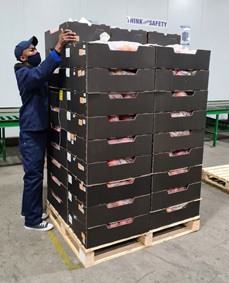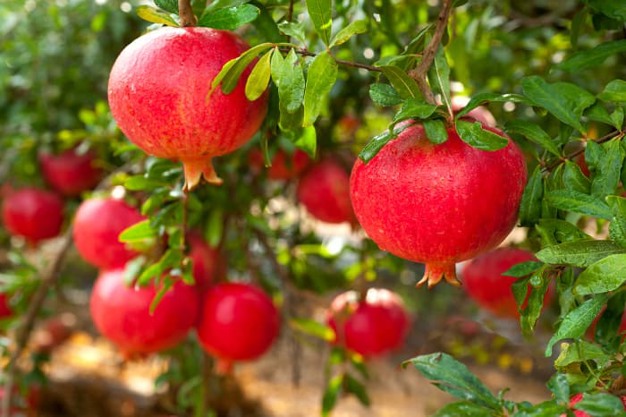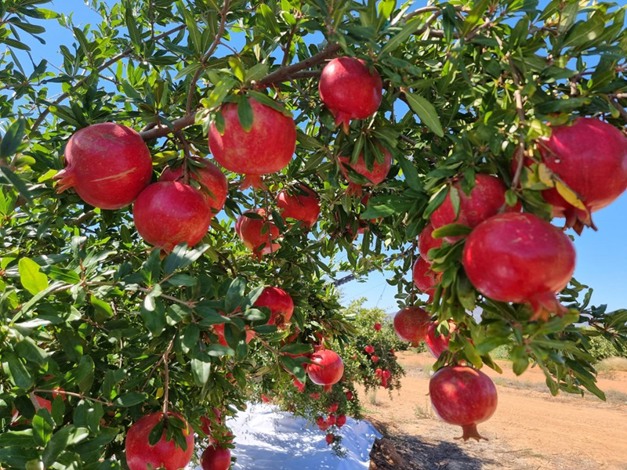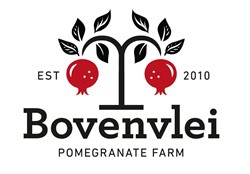 In the traditional grain area of the Swartland in South Africa, Bovenvlei farm grows the mid-season 'Wonderful' pomegranate, a hardy variety with reliable yield and market demand. Bovenvlei, with 70 ha, is one of the largest pomegranate farms in South Africa.
In the traditional grain area of the Swartland in South Africa, Bovenvlei farm grows the mid-season 'Wonderful' pomegranate, a hardy variety with reliable yield and market demand. Bovenvlei, with 70 ha, is one of the largest pomegranate farms in South Africa.
With Debbie Theunissen (a food scientist) as the managing director, an operational team successfully produces between 35 and 45 tonnes per hectare.
The farm, established in 2011, already started earning export returns by the fourth year, with an estimated harvest of 2,000 tons expected for the 2024 season, which starts in March.
"In the past, the harvest usually started on 25 March," remarks Bovenvlei's technical manager Hendri Venter, "but this year we're looking to start on 6 March already. An early start to the season which has us running around a bit!"
Due to climatic conditions during the past growing season, a decrease in crop volumes of about 10 to 15% is expected.
"We have to look at the realities in South Africa, which are long travel distances and storage ability," notes Elrita Venter, a plant pathologist (and director at Bovenvlei) whose interest in alternative crops started while still an employee of the National Department of Agriculture. When she embarked on a new career as a farmer, she identified pomegranates as a high-value crop that could profitably be grown on smaller areas.
The pomegranate cultivation area in South Africa spans approximately one thousand hectares and has maintained this size for the past few years.
Hendri notes that pomegranates are not an easy crop to farm. "It is intensive, and because it's a new industry there's not yet enough information available on production practices. There's also a limited number of registered crop protection remedies to apply during production and postharvest."

Middle Eastern shoppers look deeper
Bovenvlei is involved in the marketing of their own fruit while exporters handle trade with certain destinations and retailers.
"We're satisfied with the internal quality of our fruit – although it remains a challenge to manage wind damage and sunburn in our area. This can result in a lower percentage class 1 packouts, with higher volumes of fruit allocated for processing," he explains. "The demand for class 1 fruit remains high and at Bovenvlei, we continue to improve our production practices to achieve higher class 1 packouts."
He adds: "We also export to processors in the EU and UK: processing, specifically, is a growing market for us due to excellent internal quality with high sugars and well-balanced acidity - a result of our dry hot summers."
Pomegranates are still purchased for garnish or as a health food in Europe, often in pre-pack loose aril format.
Besides processing, a large percentage (and counting) of Bovenvlei's pomegranate crop goes to the Middle East.
"We are looking forward to, in future, also being able to access new markets such as Asia and the USA," he remarks.
Snug window for pomegranates in the packhouse
Pomegranates are packed at third-party packhouses, and there aren't many that handle pomegranates.
"When we start packing, there might still be some stonefruit in cold storage at the packing house, and towards the end of our packing season, citrus is already starting to come in. This leaves us with a tight window to harvest and pack our fruit," Hendri says.
During harvesting, the 35 permanent employees at Bovenvlei increase to more than 400.

Passionfruit bookending pomegranates
"We are busy bringing in passionfruit together with the pomegranates. We have two main peak harvest seasons [on passionfruit]: from the middle of January to the end of March, when pomegranates start, and again from the end of April up until July, "Hendri sets out.
"And then we harvest twice a week. Very labour-intensive."
Their passionfruit is mostly sold at the local Cape Town Market while exports are planned for the future.
"The situation at the port of Cape Town – we wait with anticipation to see what the conditions will be when we start exports later in March."
Having to become more hands-on in farming, as a scientist, Elrita says she remains amazed at the complexities that a successful farming enterprise needs to master. "If you map out everything you need to have in place and implement efficiently – despite diverse external challenges, it's surely one of the most challenging, but exciting businesses to be in."
For more information:
Hendri Venter
Bovenvlei Farm
Email: [email protected]
https://bovenvleifarm.co.za/
